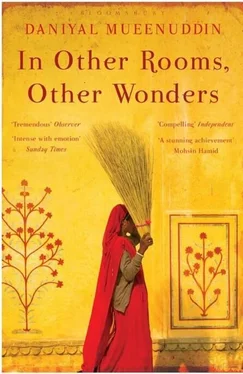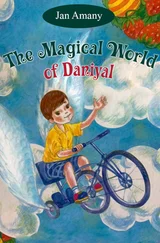He let her sleep in the stone hut, until one night, as he was watching television in his cubicle, she cautiously lifted the door flap, stood absorbing the lit red chamber for a moment, and then nimbly leaped in, eyes fixed on the television. After that, she always slept with him.
As an adolescent boy Rezak had been married, so long ago that he couldn’t remember what his bride had looked like. She had died in childbirth less than a year after the marriage, and the child too had died. Now, after so many years, Rezak again had a companion in his home. Life and hope, the flames of individuality that had burned out to nothing, to smoke, again flickered within him. Returning at night from the bazaar with a treat of late-season mangoes or a bit of meat, or stopping work in the orchard at noon to have his midday meal, which the girl warmed and served to him with hot chapattis, he looked forward to her chattering. She had a pretty, almost animal way of watching him while he ate, perched beside him, and after he finished she brought him a glass of water from the clay pot. In the evening before he came in she made tea, and when he groaned because of the aching in his legs she massaged him. Gradually he found himself able to communicate with her, and more important, she communicated with him, showed happiness when he returned at night, cared for him when he felt ill or sad. She did not, however, bear him a child.
Now that his wife cooked for him and pastured the goats, Rezak had less to do, especially after the trees lost their leaves and work in the orchard ceased. His wife sat in the dark smoky hut, cooing to herself. He would often go down to the teahouse in Kalapani bazaar and sit for several hours, watching buses fill and lumber off up the mountain to Murree or to Kashmir, or race with brakes squealing at the curves down to the cities, honking their horns to call the passengers. He strolled idly through the bazaar, wearing a new woolen vest and carrying a walking stick; or he went to the big house and sat smoking a hookah with Ghulam Rasool.
Returning to his hut at dusk after one of these excursions, he found that the fire had burned out in the hearth and his wife was gone. The goats too were missing, although she should have brought them in by this time. Sitting in the cold room, he stared at the calendar nailed up on the wall, which showed an elaborate Chinese pagoda. He rubbed his hands together, trying to control his anger. Twice before, when she had disappeared at nightfall, he’d found her far down in the valley, cowering behind some rocks. When he approached her she grew frightened and covered her face with her hands.
At dark she still had not returned. Rezak took the lantern, lit the tiny flame, and went out, the two goats scrambling in, bleating, when he opened the wooden gate that led down into the valley.
One of the neighbors called, ‘Hey, Rezak, can’t it wait until morning?’
‘What can I tell you. My poor old lady’s disappeared again.’
The neighbor sent a little boy to help with the search.
Rezak walked all over and called and called. He went home, hoping that she would be there waiting for him, but he saw no glimmer of light in the cooking hut. As he sat in the cold, the sound of twigs breaking as he laid the fire seemed particularly loud. The fire caught, crackling, slowly warming the room. Mechanically he threw a handful of tea in the kettle, boiled the water, mechanically poured it into the cup. He didn’t have it in him to be angry now. Without eating dinner, without turning on the television, as he did every night, he lay alone in the dark cabin, wondering what could have become of her. What if she was lying hurt somewhere in the forest?
In the morning he woke before first light, hurriedly dressed, and went out. He didn’t know where to look, which direction to turn. Living alone for years, he had learned not to ask for help. Neighbors would do whatever they could once or twice or five times, but ultimately, they would grow cold and resentful. He walked along the paths that she might have taken, then deep into the woods to the places where she cut grass. Once he saw a cloth that he thought might be her shawl, but coming close he saw that it had been rained on and must have been lying there for days.
Finally he went to ask the Harouni retainers for help. Going into the servants’ common room, he found Ghulam Rasool lying peacefully on a charpoy, his unlit hookah beside him. The fireplace chimney had backed up, as it always did, filling the low-ceilinged room with layers of acrid pine smoke.
As Rezak walked into this familiar room, he broke down for the first time. His arms hung loosely as he shuffled up to the bed and stood with his face contorted.
‘My wife disappeared,’ he blurted out, before he had even said salaam . ‘I can’t find her anywhere. She’s gone.’ flat tears slipped out of his gummy eyes and disappeared into the wrinkles of his face. Remembering himself, he reached down and shook Ghulam Rasool’s hand respectfully.
‘What do you mean, “disappeared”?’ asked Ghulam Rasool, startled. Squeezing Rezak’s arm to make him sit on the charpoy, he called out through the door, ‘Hey, one of you boys come here.’
Four gardeners answered the summons, and, after asking a few questions, ignored Rezak. They huddled together and made their plan, eager as a pack of hounds, then headed out, their wooden staffs tapping quickly as they walked off on separate paths.
Late at night they straggled back, one by one, having found no trace of the woman. In the morning early they went out again, determined to find her. They searched the mountains, the furthest terraced fields, went to the nearby villages. The next day again they searched from dawn to dusk, and then the next, but with less and less determination. One of them asked at every bus stop from Murree down to Rawalpindi. Another went all the way to the girl’s family home up the mountains almost in Kashmir, but they had seen nothing of her — in any case, she couldn’t possibly have made the long journey alone. Finally, only Rezak kept searching. He forgot even where he had already been, returning to the same places, as if this time he might find her there.
One morning, getting ready to go out and continue the search, he sat down again, took off his coat, and lay down on the bed. Imbecile, chattering — but she was gone, dead or stolen, taken to the brothels of ’Pindi or Karachi. He prepared himself to bear the loneliness again.
Every year at Christmas the Harounis gave a big party at Kalapani, with roast goose, a twenty-foot tree in the entrance hall of the house, and a ho-hoing Santa Claus for the children. Trucks brought logs for a bonfire from the Harounis’ farm down on the plains, so that late at night the servants could grill spicy, greasy kebabs on the coals for the heavy drinkers and mull cauldrons of spiced punch for the rest. The guests came up from Islamabad singly or in long chains of cars, blowing in through the door with wrapped presents and bottles of wine and champagne, which Ghulam Rasool placed on a long table standing in the hall.
Before dinner, the mistress came into the kitchen. The cook stood rubbing his hands on his apron, sidelined in his own domain, as she took a big bowl under her arm and poked with a spatula at the mashed potatoes, which the cook had already beaten to a creamy smoothness.
Ghulam Rasool had been following her impassively as she performed her inspection.
‘Excuse me, Begum Sahib, may I trouble you with a small request?’
‘Of course,’ she said, touching him lightly on the shoulder. He had become accustomed to this, although at first it had disturbed him.
Briefly, he explained about the disappearance of Rezak’s wife.
‘But Ghulam Rasool, you should have told me right away. What can I do?’
Читать дальше












